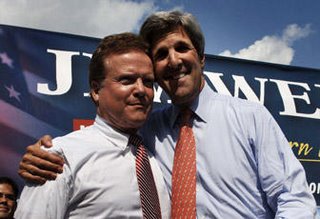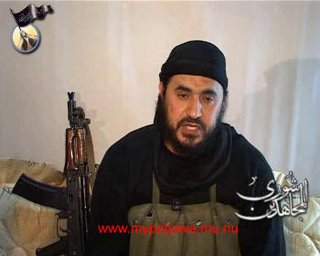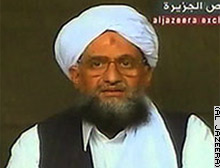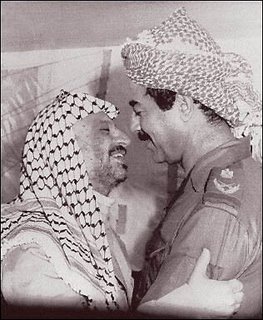 MANY ON THE RIGHT FEAR THE SURGE WILL FAIL, BUT WANT IT TO SUCCEED. THE LEFT EXPECTS AND WANTS IT TO FAIL, AND THEY JUST WANT WITHDRAW THE TROOPS. SO, WHICH POSITION IS MORALLY SUPERIOR AND LOGICALLY SOUND?
MANY ON THE RIGHT FEAR THE SURGE WILL FAIL, BUT WANT IT TO SUCCEED. THE LEFT EXPECTS AND WANTS IT TO FAIL, AND THEY JUST WANT WITHDRAW THE TROOPS. SO, WHICH POSITION IS MORALLY SUPERIOR AND LOGICALLY SOUND?GOLDBERG HAS THE ANSWERS:
"As I look at Iraq, I recall the words of former general and soon-to-be-President Dwight Eisenhower during the dark days of the Korean War, which had fallen into a bloody stalemate. 'When comes the end?' ... And as soon as he became president, he brought the Korean War to an end."GOLDBERG CONTINUED/THE CORNER:This was part of freshman Virginia Sen. Jim Webb's much ballyhooed stentorian Democratic response to President Bush's State of the Union address.
One wonders if the untold millions of North Koreans who've starved, bled, and died since then would similarly applaud Eisenhower's courage and wisdom. For more than half a century, North Korea has been a prison-camp society beyond the imagining of George Orwell, where public executions for stealing food are familiar events. The man-made famine of the 1990s alone claimed the lives of up to 1 million people (hard data from Stalinist regimes are difficult to come by).
One also wonders: When are our troops going to come home? Technically, the Korean War isn't really over. We're merely enjoying a ceasefire — much like the one we had with Iraq in the 1990s.
While Webb favors a "formula that will in short order allow our combat forces to leave Iraq," our forces in South Korea have been there for nearly six decades. Something tells me the antiwar base of the Democratic party doesn't have that sort of timetable in mind for Iraq.
So, except for the fact that the Korean War didn't end, our troops are still there, and the outcome has been the source of humanitarian and national-security nightmares, Webb's salute to Eisenhower's statesmanship really strikes home. [Umph added.]
In fairness, Webb is a thoughtful man who takes foreign affairs more seriously than most politicians. But his closest-weapon-to-hand style of attack against Bush does not reflect well on him or the Democratic party that chose him to be its representative.
But it is revealing. Indeed, the Democratic party's most honest moment Tuesday night came not in Webb's brusque words but in the Democrats' brusquer body language.The president asserted that no one wants failure in Iraq. Understandably, the commander in chief wanted to avoid conceding how very real a possibility failure is, so he chose his rhetoric carefully. He spoke in the abstract about the bipartisan desire for victory and success.
And yet the Democrats for the most part sat on their hands, refusing to applaud, never mind rise in favor of such statements from a wartime president. Then, when the president mentioned ending genocide in Darfur, House Speaker Nancy Pelosi and her party leaped to their feet.... None of this explains why Democrats are so eager to support continued U.S. fighting against the Taliban as part of NATO forces in Afghanistan, even though that puts us between two sides in what amounts to an Afghan civil war. But maybe Afghanistan is a humanitarian crisis too. Or maybe it's an excuse for Democrats to prove they are still tough as far as foreign policy.
Or maybe Democrats simply think the war in Iraq is lost, while there's still hope in Afghanistan ... assuming there's a principle in there somewhere.
... The 11th Commandment for liberals seems to be, "Thou shalt not intervene out of self-interest." Intervening in civil wars for humanitarian reasons is O.K., but meddling for national-security reasons is not.
This would explain why liberals supported interventions in civil wars in Yugoslavia and Somalia but think being in one in Iraq is the height of folly. If only Truman had called the Korean civil war a humanitarian crisis, Ike might not have called the whole thing off. ...
There seems to be only one hope for persuading the Democrats to support staying in Iraq. Let's just beat the rush and call Iraq a humanitarian crisis now. It surely is already. And if we leave prematurely, Iraq will undoubtedly give Darfur and Yugoslavia a run for their money as a humanitarian horror show. Why wait for calls to return to stop the bloodshed?
I'm actually quite sincere when I ask the following question: Does anybody — anybody — seriously think the effort in Afghanistan has more at stake for the war on terror than than the effort in Iraq?
I am in no way saying that Afghanistan isn't important. It's very important. But it seems so transparently obvious to me that Iraq is more important, that the downsides of failure are more grave, that the upside of success more rewarding, that I simply have a hard time believing anyone sincerely feels otherwise after seriously engaging the facts.
Moreover the moral concerns are so much greater, in terms of the humanitarian consequences of departure and America's obligation in Iraq.The case could easily be made that we owe the Afghans nothing. We attacked their government after we were attacked by people given safe harbor and support on their soil. We did what we needed to do, and now we can leave. I don't agree with that argument, but it seems so much more compelling for Afghanistan than it does for Iraq, where we did launch a war of choice and therefore have a greater obligation to do right by the Iraqi people and to stay true to our democratic ideals.
This Democratic talking point about Afghanistan being the central front of the war on terror seems like such convenient b.s. I'm shocked they say it so glibly.
But maybe I'm wrong and there's a great argument I haven't heard.
I think Goldberg is effin' BRILLIANT. BOTTOM-LINE: The GWOT has many fronts, just like WW2 and WW3, (The Cold War). Some are fought openly, some clandestinely, some by proxies. The enemy has many factions - and they might kill each other at times, (witness Gaza or Baghdad), but against the West they are united: Afghanistan; Iraq; the Philippines; Thailand; Somalia - many fronts, ONE WAR. A war we must fight to WIN - ON ALL FRONTS.
[ASIDE: WHO ELSE SUPPORTS WEBB? CLICK HERE.]
NOTE: I've pasted several photos of the enemy in this post: an Egyptian, a Jordanian, a Saudi, an Afghani, an Iraqi and a man who was born in Cairo who claimed to be "Palestinian." ALL ENEMIES. ALL WORKING OFF THE SAME GAME-PLAN: JIHAD. We simply must fight them all...








No comments:
Post a Comment